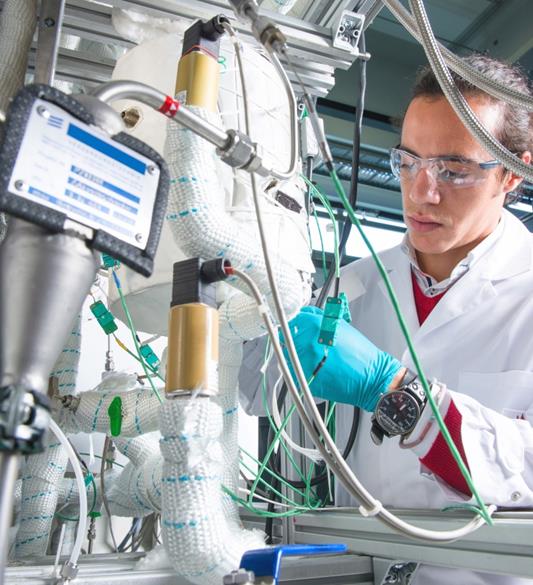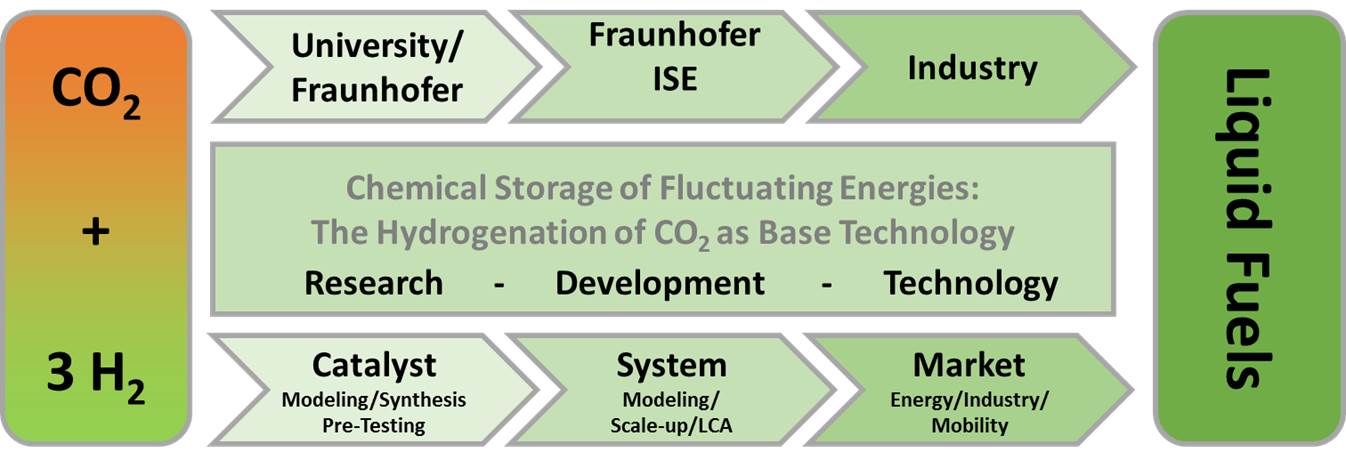| Duration: | January 2015 - September 2018 |
| Contracting Authority/ Sponsors: | Fraunhofer Society, German Federal State Baden-Württemberg |
| Project Partners: | Institute of Inorganic & Analytical Chemistry at Albert-Ludwigs-University Freiburg, Fraunhofer Institute for Mechanics of Materials IWM |
| Website: | http://www.leistungszentrum-nachhaltigkeit.de/en/pilot-projects/hyco2/ |
| Project Focus: |
HyCO2 – Liquid Energy Storage, Chemicals, and Fuels from CO2 and H2



The Power-to-Liquid (PtL) technology - the conversion of CO2 with sustainable H2 (e.g., generated through water electrolysis) to liquid compounds, such as methanol - offers numerous advantages: seasonal energy storage, a chemical buffer for provision of fluctuating renewable energies, reduction of CO2 emissions, generation of alternating fuels with improved combustion properties and valuable platform chemicals, importantly based on a sustainable and reliable energy/feedstock supply (e.g. from industry). Against this background, the pilot project of the “Sustainability Center Freiburg” investigates this process under the title “HyCO2” and concerns a joint research and development project between the Fraunhofer ISE, Fraunhofer IWM, and the Institute of Inorganic & Analytical Chemistry at the University of Freiburg.
A key contribution to the successful development of the PtL technology will be the energy-efficient synthesis of methanol based on the direct hydrogenation of CO2 (e.g. sourced from industrial waste streams), in turn enabling significant reduction in greenhouse gas (GHG) emissions. In this context, the objective of the “HyCO2” project is to establish an improved understanding of the mechanism of methanol synthesis, to develop more active catalysts, and to improve the synthesis process, including an optimization of the overall production system (i.e. electrolysis, methanol synthesis). Furthermore, feasibility studies and life cycle analyses are performed. These are supplemented with social-political and market analyses regarding acceptance and perception of this fuel and chemical production platform. The project results will support the realization of a liquid energy storage platform, contributing to the supply of renewable energies, as well as a reduction in GHG emissions, in turn improving energy security and reducing the importation of fossil fuel-based energy carriers. In this context, we perform research on the PtL concept, as it enables renewable energy storage in liquid form. Using methanol as an example, this liquid energy store can be also be upgraded (e.g. to higher energy density fuels or functional intermediates) and dropped into existing fuel infrastructure/chemical industry, therefore enabling the sustainable provision of fuels and chemicals to a variety of sectors and applications. For example, the upgrading of methanol using innovative catalyst and process design enables the production of sustainable fuels, including Dimethyl Ether (DME) and Oxymethyl Ethers (OME). The PtL concept thus has the potential to reduce dependency of these sectors on crude oil and natural gas import and use, whilst simultaneously facilitating large scale renewable energy storage and reduced GHG emissions (e.g. in the mobility sector).